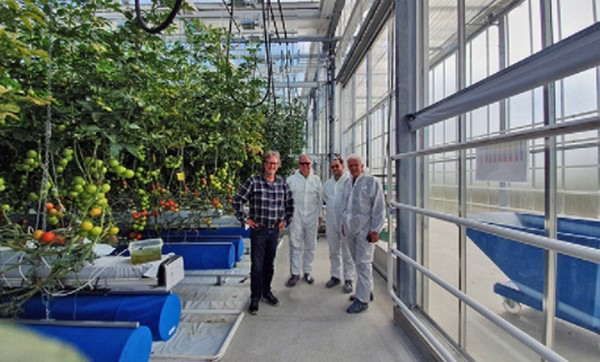The Norwegian Institute of Bioeconomy Research (NIBIO), one of Norway’s largest research institutes, published a report today that showed that GreenCap Solutions AS’ patented Environmental Control System (ECS) increases tomato yields more than three-fold while eliminating the use of fossil fuel for heating and CO2 for growing the crops.
GreenCap Solutions’ ECS system replaces heating from natural gas with captured solar energy from the greenhouse air. It also captures CO2 from the air outside the greenhouse. NIBIO performed two experiments between 2019-2020 on tomato crops, to verify the impact of the ECS technology on the production and quality of greenhouse tomatoes. The researchers compared a traditional seasonal production system with a traditional year-round production system using supplemental light, and a new year-round production system using supplemental light regulated by the ECS system. In its report “Verification of the GreenCap Solutions AS Environmental Control System,” NIBIO demonstrates how tomato yields increased from 42 kg m-2y-1, in a traditional seasonal production system, to 116 kg m-2y-1, in a traditional year-round production system using supplemental light, to 151 kg m-2y-1, in the ECS-regulated year-round production system using supplemental light.

The team with GreenCap Solutions
“Meeting the rising food demand of a growing global population requires new and sustainable production methods. Hydroponic greenhouse production systems provide the best conditions for maximizing photosynthetic performance, resulting in high yields and product qualities for fruits and vegetables all year round, anywhere in the world. However, greenhouse production is very resource-demanding and emits relatively high levels of CO2. GreenCap’s Environmental Control System has come up with a solution that solves this problem,” says Michel Verheul, a senior research scientist at NIBIO and first author of the report.
Reducing CO2 footprint
“In order to develop sustainable greenhouse production systems, it is necessary to come up with solutions that can reduce their CO2 footprint. That is what we’ve set out to do at GreenCap Solutions and we are thrilled to have it confirmed again by NIBIO that our technology not only vastly improves the quality and quantity of greenhouse crops, but also dramatically reduces their environmental footprint, essentially making them climate neutral,” says Jarle Skjæveland, chief strategy officer at GreenCap Solutions.
The results from NIBIO’s experiments confirmed that the ECS system could regulate climatic conditions in greenhouses to a desired optimal level for fruit production and quality. Using ECS, windows remained closed, CO2 concentration remained at a high level, relative humidity was kept at the desired level of 75-85%, and the inside temperature was regulated independently from the outside temperature and radiation. There was no need to use fossil fuel for heating nor CO2 supply. While the traditional seasonal production system recorded 4.1 kg CO2 per kg of tomatoes produced, the year-round production system regulated by the ECS system, recorded around 0 kg CO2e per kg of tomatoes produced.
Less chemical crop protection
In addition to a decrease in CO2 emissions and a substantial improvement in the quality, size and taste of the fruit, greenhouse crops grown using the ECS system have high water use efficiency and less need for chemical plant protection agents. NIBIO’s experiments revealed that water generated by the transpiration of the tomato plants, roughly 90% of the water uptake, was collected from the greenhouse air by the ECS system. Due to the closed windows and the controlled temperature and relative humidity in the greenhouse air, there was no need for chemical plant protection. “In the quest for effective and sustainable food production systems, GreenCap’s Environmental Control System is a game-changing technology that can transform greenhouse production worldwide,” Verheul concludes.
For more information:
GreenCap Solutions
www.greencap-solutions.com
